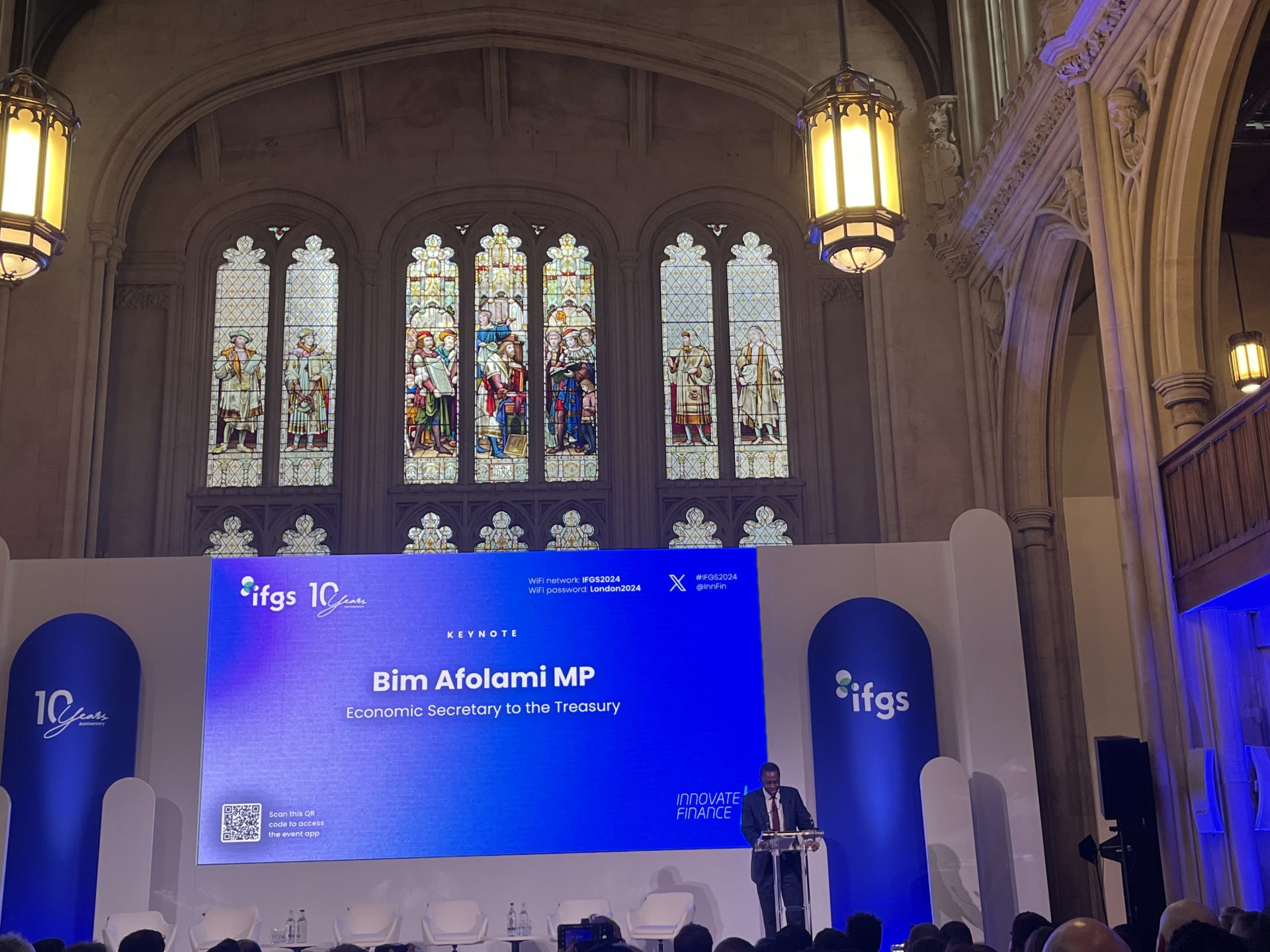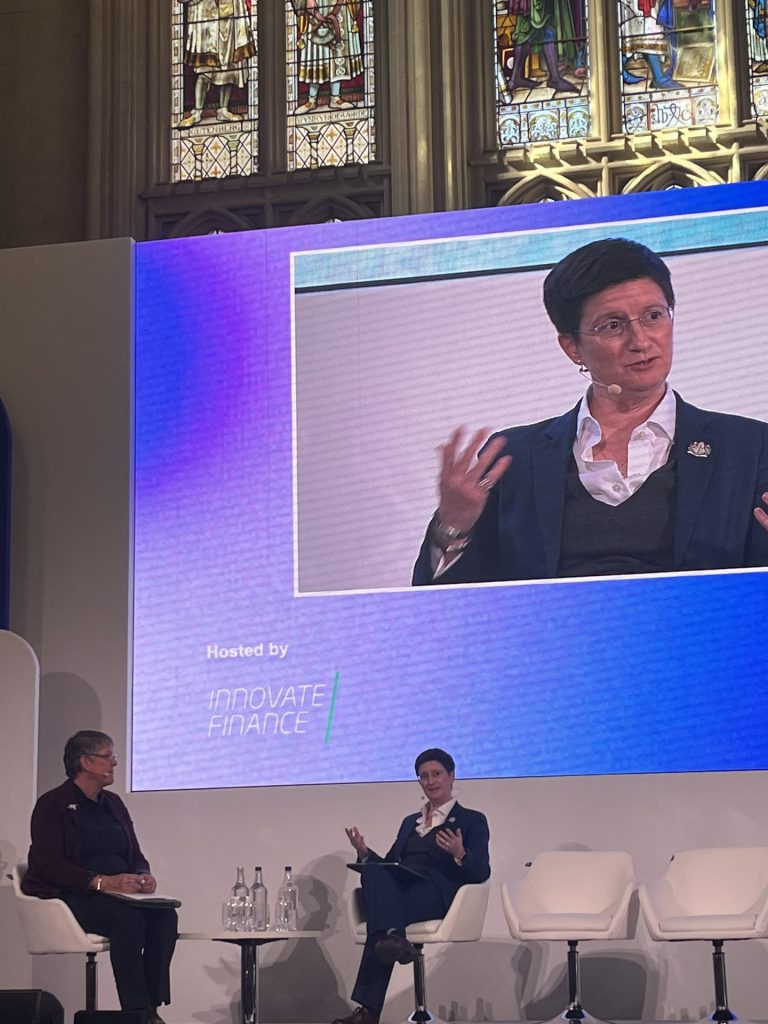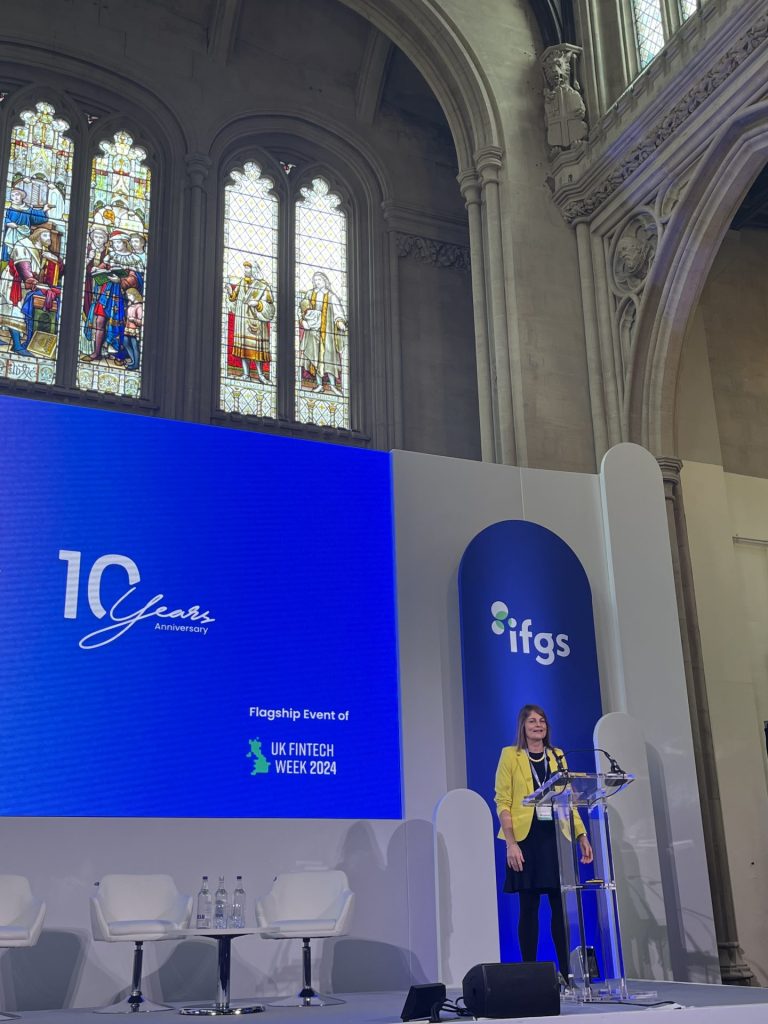Cicero at Innovate Finance Global Summit 2024
by Harriet Hill, Senior Consultant
18 April 2024
The Innovate Finance Global Summit (IFGS) celebrated its tenth anniversary this week, with leading FinTechs, policymakers and investors coming together at London’s Guildhall to discuss the future of the sector. To mark the anniversary, a time capsule documenting 10 years of FinTech innovation will be hidden in the City of London and opened in 10 years’ time.
Prime Minister Rishi Sunak made a short appearance via video message where he stressed the Government’s support for the sector, highlighted Innovate Finance’s recently launched Unicorn Council, and heralded the “power of technology to make life better for everyone.”
H/Advisors Cicero consultants were also in attendance, as well as our Founding Partner and Executive Chairman, Iain Anderson, who spoke at Monday’s session, “The Globe at the Polls” on this big year in democracy.

Overall, a key theme of the conference was the importance of creating an environment for start-ups to scale up. Many of the conversations also highlighted the power of partnerships – whether between investor firms and SMEs, or regulators and business. There was much ambition felt across the Summit, with a sense of pride for what the UK has achieved in FinTech, the need to continue to innovate and the need to create a regulatory environment that supports innovation and UK competitiveness.
Highlights of the IFGS
Economic Secretary to the Treasury, Bim Afolami MP, delivered a keynote speech on Monday.
Afolami set out the importance of the FinTech market to the UK, highlighting that 86% of digitally active UK adults use a FinTech product or service on a daily basis. HM Treasury is exploring the regulatory framework to oversee data sharing, seeking to make this fair and equitable, commercially sustainable and safe. Afolami announced:
- A new Taskforce on Open Finance, chaired by Centre for Finance, Innovation and Technology (CFIT), which will be working to create clear recommendations to drive a SME use case for smart finance;
- The National Payments Vision will be published this Summer, before Parliamentary recess; and
- The Government will legislate by the end of July for regulators to introduce the regulatory framework for crypto assets, with the aim of driving forward transformational tech.
Tulip Siddiq MP, Shadow Economic Secretary delivered a keynote speech on Tuesday,
She set out Labour’s belief in the importance of FinTech in showcasing the UK’s strengths of the 21st century – seeking to grow the economy by growing the industries of the future. Key points from her speech included:
- AI: Siddiq noted legislation is needed to set international standards for AI’s use in financial services. She said it would need to provide clear standards in AI safety whilst enabling firms to utilise technology.
- Open Banking: Tulip noted that the next phase of open banking would unlock the power of payments, leading to consumer empowerment and financial inclusion. She concluded that the UK must embrace open finance to support financial wellbeing.
- CBDCs: In her speech, Siddiq said a Labour government would advance the ongoing work on Central Bank Digital Currencies (CBDCs) to create a UK global hub for securities and tokenisation.
- Financial inclusion: Labour would also create a regulatory sandbox for financial inclusion in partnership with the FCA and PSR; testing financial products for underserved communities.
- Growth: Labour would explore using HMT to drive growth and tackle regional inequality, with the FinTech sector at the heart of Labour’s plan on inclusive growth. Labour would look to celebrate and hone the FinTech specialities of regional hubs in the UK – using Starling Bank in Wales as an example – to drive regional growth.
- Regulation: A Labour Government would work with the FCA to make its regulatory handbook less burdensome, stating that outdated FCA rules prohibit innovation. Specifically, Tulip said Buy-Now-Pay-Later regulation was a priority for Labour.
- Gender reporting: Labour wants to increase the representation of women in FinTech and champion the Women in Finance Charter, increasing gender reporting and guidance on diversity and inclusion.
- First 100 days: Finally, Siddiq said the Labour Party does not have the support of the civil service in preparing for government, so welcomed expertise from firms on Labour’s first 100 days in office. She requested those with ideas to kickstart her programme of work should reach out to her office.


Other speakers at the IFGS
- Aidene Walsh, Chair of the PSR, shared the end of year reflections of the Payments Systems Regulator (PSR). She noted the PSR’s relationship with the FinTech sector and wider community is mission critical, reflecting the strong focus on innovation which is built into the PSR’s statutory objectives.
- Sarah Breeden, the Deputy Governor for Financial Stability at the Bank of England, outlined the Bank’s approach and expectations towards payments innovation.
- Ian Phoenix, Director of Intelligence & Digital at the FCA spoke of the importance of innovation to the FCA, with tech and policy sprints, sandboxes and the innovation network supporting their work to protect consumers and promote competition in a rapidly evolving digital ecosystem.
- Julia Hogget, Chief Executive Officer at London Stock Exchange used her fireside chat to highlight the importance of drawing on the UK’s pool of institutional investment, the second largest in the world, to start up and scale up businesses, with the UK’s competitiveness dependent on connecting Unicorns with capital markets.
- Lord Philip Hammond took part in a fireside chat where he noted the FinTech sector has thrived, drawing down talent from around the world. He argued that we need to rethink the post-Brexit settlement to ensure firms are still able to hire seamlessly from overseas. He added, a firm needing specific technical expertise should be able to locate talent from anywhere in the world on a Thursday, and have them in their office the following Monday. Finally, Lord Hammond expressed concern over Labour’s workers’ rights agenda for small dynamic businesses.
Other Announcements
- Innovate Finance’s Unicorn Council for UK FinTech published six recommendations for policymakers which are designed to maintain the UK’s leading global position in FinTech. Core recommendations include the abolition of Stamp Duty, a rethink to regulation, broadening of the tax R&D scheme and business asset disposal relief. The Council also called for updates to the EMI and EIS schemes, as well as the introduction of a VAT-rebate scheme for early stage FinTechs.





